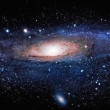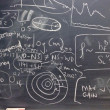Is there Life Elsewhere in the Cosmos?
by Magis Center of Reason and Faith
Filed under Cosmology

The December Wall Street Journal editorial by Eric Metaxas, "Science Increasingly Makes the Case for God", has generated significant interest and discussion. Metaxas’ main point is that the probability of life existing in our inhospitable universe is so close to zero that only a supernatural explanation (i.e., God) can account for our existence here on Earth. We agree with Mr. Metaxas that the odds against an anthropic universe are staggeringly high, but we’re not as convinced that... Read More
Irreconcilable Differences: The Divorce of Materialism and Truth
by Philip Lewandowski
Filed under Anthropology, Belief, Evolution

According to many today, the advance of the natural physical sciences continues to shrink the “space” for God. The “gaps” where someone can place God are decreasing, and therefore the “God hypothesis” will one day be swallowed whole by the progress of the scientific endeavor. Even more, the “space” where one could posit the human person as something more than just a complex, organized collection of matter and energy is said to have disappeared. While I find a materialist... Read More
Whatever Happened to the Soul?
by Dr. Benjamin Wiker
Filed under Anthropology, Christianity and Science

Bad news, friends. You have no soul, according to a few professors at Fuller Theological Seminary. I say this after happening upon a copy of Whatever Happened to the Soul? Scientific and Theological Portraits of Human Nature, edited by Warren Brown, Nancey Murphy, and H. Newton Malony, all full-fledged Fullerian professors. They say the soul is now scientifically, and hence theologically passé. What happened to the poor soul, that it should suddenly be shuffled away? According to Murphy,... Read More
The Self-Defeating Argument About Intelligence
by Dr. Stacy Trasancos
Filed under Anthropology, Science

Alexander Wissner-Gross, a physicist at Harvard University and the Massachusetts Institute of Technology, and Cameron Freer, a mathematician at the University of Hawaii at Manoa, have developed an equation to describe intelligent or cognitive behaviors. They suggest that intelligent behavior can be explained as an impulse to control events in the environment. The mathematics are rooted in the theory of thermodynamics. The model relies on entropy, the mathematically-defined thermodynamic... Read More
Marin Mersenne: A Priest at the Heart of the Scientific Revolution
by Andrew Kassebaum
Filed under Christianity and Science

In late 1644, the Minim friar Marin Mersenne (1588-1648) travelled to Florence and assisted Evangelista Torricelli (1608-1647) in repeating his famous barometric experiment. When Mersenne returned to France, he shared Torricelli’s discovery with his network of correspondents, “giving rise to flourishing experimental and theoretical activities,”1 including the famous work on the weight of air conducted by Blaise Pascal (1623-1662). This is one of many contributions Mersenne would... Read More
Why Something Rather than Nothing?
by Matt Fradd
Filed under Cosmology, The Existence of God

After a night of teenage exuberance, my friends and I would usually end up lying out on a country road, gazing up at the starlit Australian sky, discussing the meaning of it all. We considered ourselves nonreligious, and yet there was something (isn’t there?) about the enormity of the sky that humbled us, stirred us, inspired us to ask deep questions about, well, everything. We called these GLUE conversations—GLUE being an acronym for God, life, the universe, and everything. One of... Read More
Can We Make Sense of the World?
by Dr. Edward Feser
Filed under Cosmology

Is reality intelligible? Can we make sense of it? Or is the world at bottom an unintelligible “brute fact” with no explanation? We can tighten up these questions by distinguishing several senses in which the world might be said to be (or not to be) intelligible. To make these distinctions is to see that the questions are not susceptible of a simple Yes or No answer. There are in fact a number of positions one could take on the question of the world’s intelligibility –... Read More
Stem Cell Research and ‘Science vs. Religion’
by Joe Heschmeyer
Filed under Christianity and Science

A 2005 New York Times article begins: "When Donald Kennedy, a biologist and editor of the eminent journal Science, was asked what had led so many American scientists to feel that George W. Bush's administration is anti-science, he isolated a familiar pair of culprits: climate change and stem cells. These represent, he said, 'two solid issues in which there is a real difference between a strong consensus in the science community and the response of the administration to that consensus.'" There's... Read More
Causality and Radioactive Decay
by Dr. Edward Feser
Filed under Science

NOTE: Today we finish our two part series by Dr. Edward Feser exploring questions about science, philosophy, causality, and radioactive decay. You can read the first part here. Now, if there must be causality at the macro level (at the very least in the case of the causal relations between the external world and our perceptual experiences of it), and this causality is not captured in the description of the world that physics itself gives us, then it follows that there... Read More
Fads and Fallacies in the Name of Science
by Dr. Edward Feser
Filed under Science

NOTE: Today we begin a two part series by Dr. Edward Feser exploring questions about science, philosophy, causality, and radioactive decay. We'll share the second part on Wednesday. At the Catholic blog Vox Nova, mathematics professor David Cruz-Uribe writes: "I… am currently working through the metaphysics of St. Thomas Aquinas as part of his proofs of the existence of God… [S]ome possibly naive counter-examples from quantum mechanics come to mind. For instance,... Read More






